Sennheiser Ambeo Soundbar Mini Review
The latest Ambeo is only Mini in some ways…
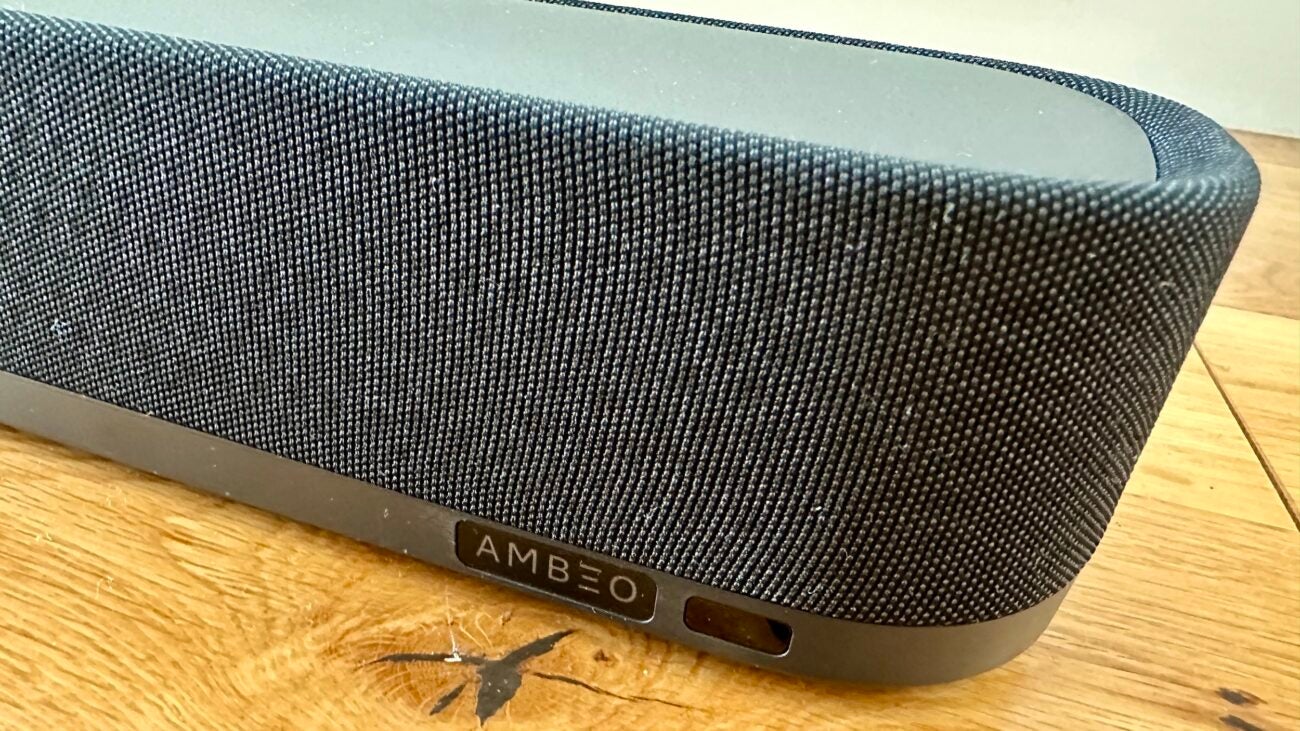
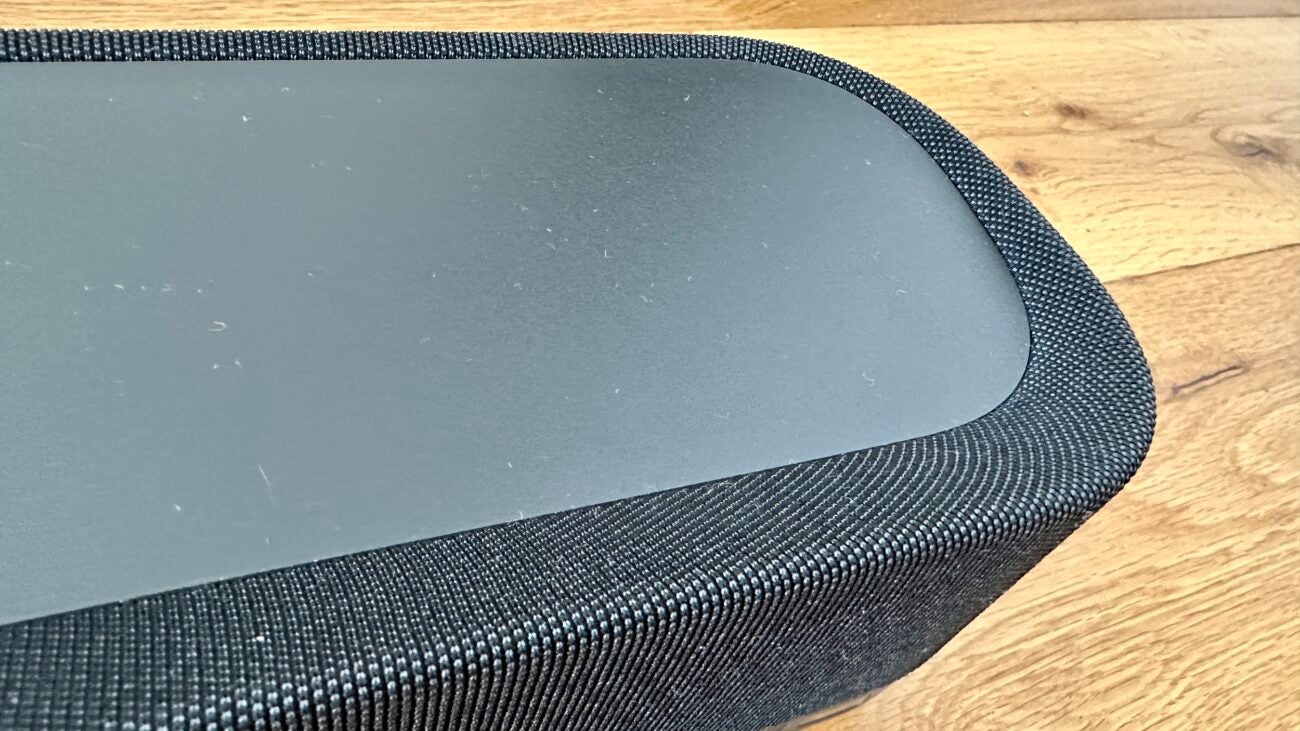

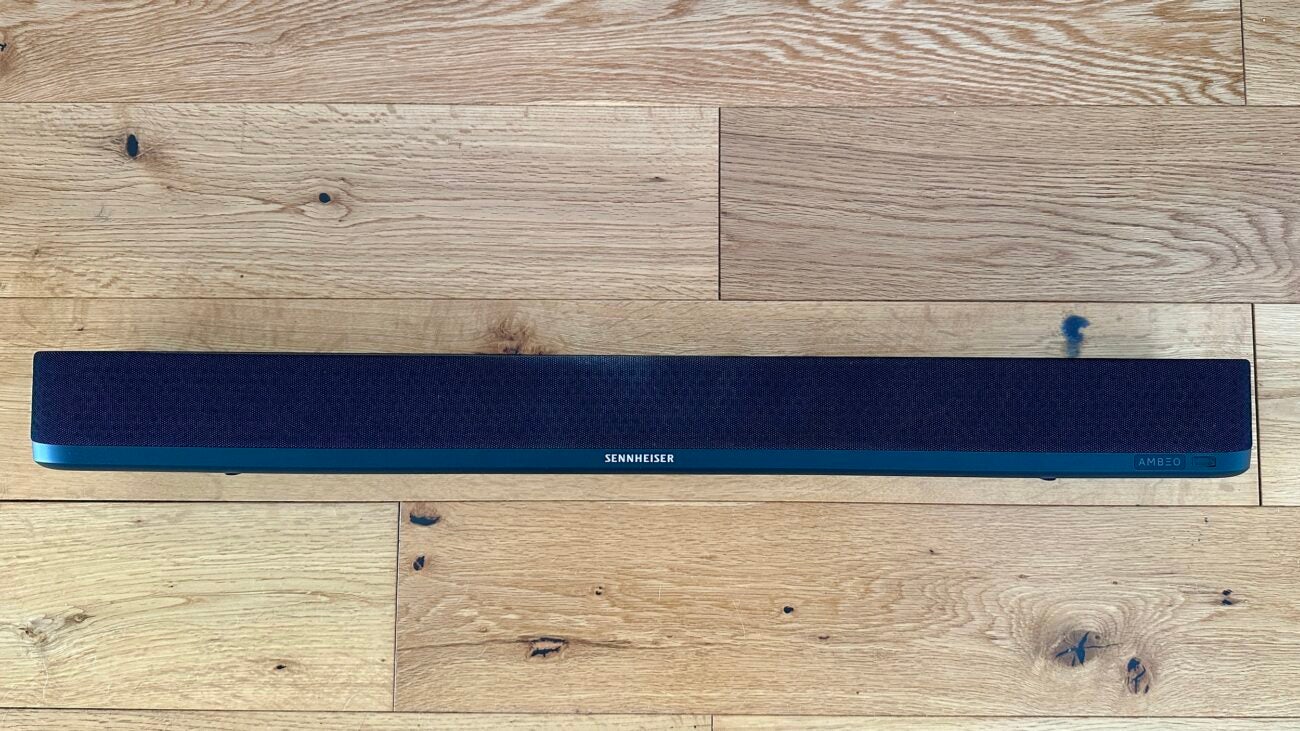
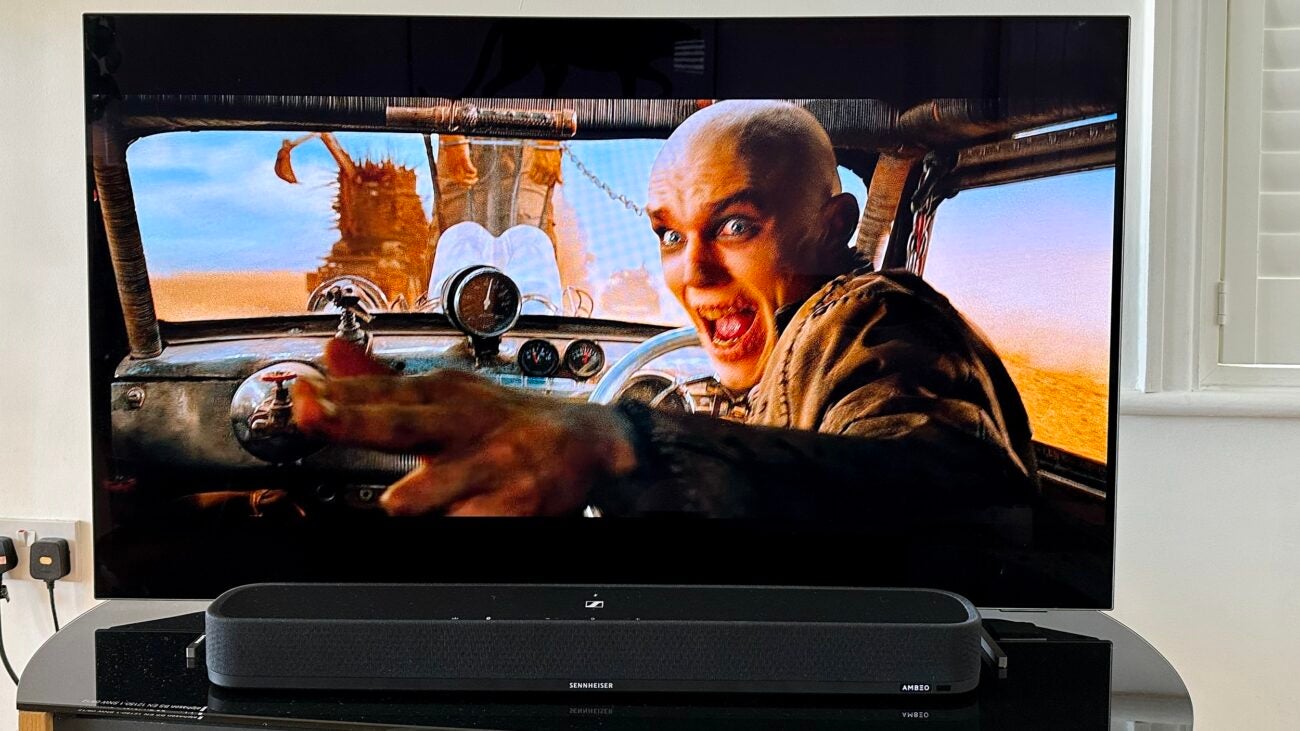

Verdict
The Sennheiser Ambeo Mini is compromised, of course – but this small, expensive, and high-achieving soundbar will nevertheless prove just the ticket for any number of people.
Pros
- Eloquent, forthright and spacious sound
- Surprising low-end presence
- Fine control options
Cons
- Can’t create as much audio ‘height’ as is ideal
- Plenty of competition in every direction
- Has issues with music reproduction
Key Features
- Power250 watts of Class D powering the speakers
- Immersive audioCompatible with Dolby Atmos, DTS:X, MPEG-H and 360 Reality Audio
- AppCan be operated/customised with Smart Control app
Introduction
The moment Sennheiser launched its Ambeo Soundbar Plus and changed the name of its original Ambeo to Ambeo Max, the path was clear for a smaller, more affordable Ambeo soundbar. And here it is, the Ambeo Mini.
It’s unusual by the standards Sennheiser has set in that it’s quite small and doesn’t cost the Earth. But where previous Ambeo soundbars have sized-and-priced themselves into markets more-or-less of their own, the Ambeo Soundbar Mini is up against it. Lineage aside, then, does it have what it takes to compete?
Availability
The Sennheiser Ambeo Mini is on sale from September 1st, 2023, and in the United Kingdom it costs £699. American customers are looking at $799 to secure one, while in Australia it’s priced at AU$1299.
This makes it the most affordable Ambeo soundbar, and by a distance – but that’s really not the same as affordable. Any number of brands with just as much credibility as Sennheiser will sell you a soundbar for this sort of money, many of which – on paper, at least – seem to have a bit more to offer. This, then, is not the first Ambeo soundbar with it all to prove…
Design
- 65 x 700 x 100mm
- Weighs 3.3kg
- Familiar looks
What happens when a Sonos Beam Gen 2 and a Sennheiser Ambeo Plus love each other very, very much? The Sennheiser Ambeo Mini, that’s what.
At 65 x 700 x 100mm it’s so similar in size and proportion to the Beam Gen 2 as to be almost indistinguishable in silhouette. In its use of high-quality plastic wrapped seamlessly in black acoustic cloth, and its sloping top panel that forms a lip where it meets the front of the chassis, it’s Ambeo Plus all the way – albeit on a smaller scale.
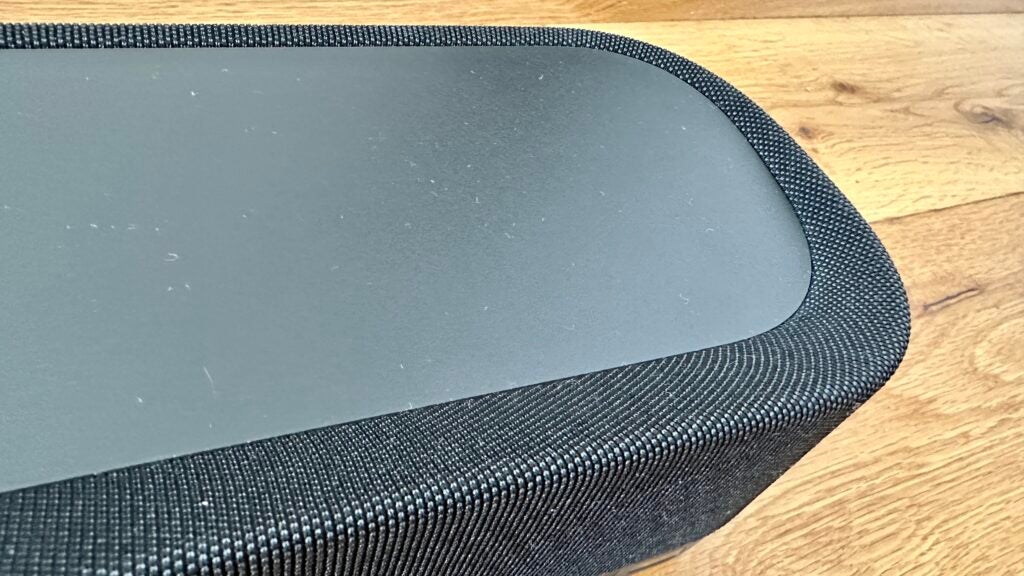
There’s not a lot of material here, not much stuff, for your money – an all-in weight of just 3.3kg confirms it. But be assured that what there is of the Ambeo Mini is flawlessly constructed and built to last.
Features
- 7.1.4 -channel virtualised presentation
- 250 watts of Class D power
- Dolby Atmos, DTS:X, MPEG-H and 360 Reality Audio compatibility
The Sennheiser Ambeo Mini is compatible with Dolby Atmos, 360 Reality Audio, DTS:X and MPEG-H spatial audio formats – that’s a fact, and therefore a feature. What’s less of a feature is Sennheiser’s stated desire to deliver 7.1.4 -channel sound from just six drivers – that’s more of an aspiration.
To try and make its dreams come true, Sennheiser has deployed six drivers that are subject to some fearsomely complex virtualisation technology the company developed in tandem with Fraunhofer.
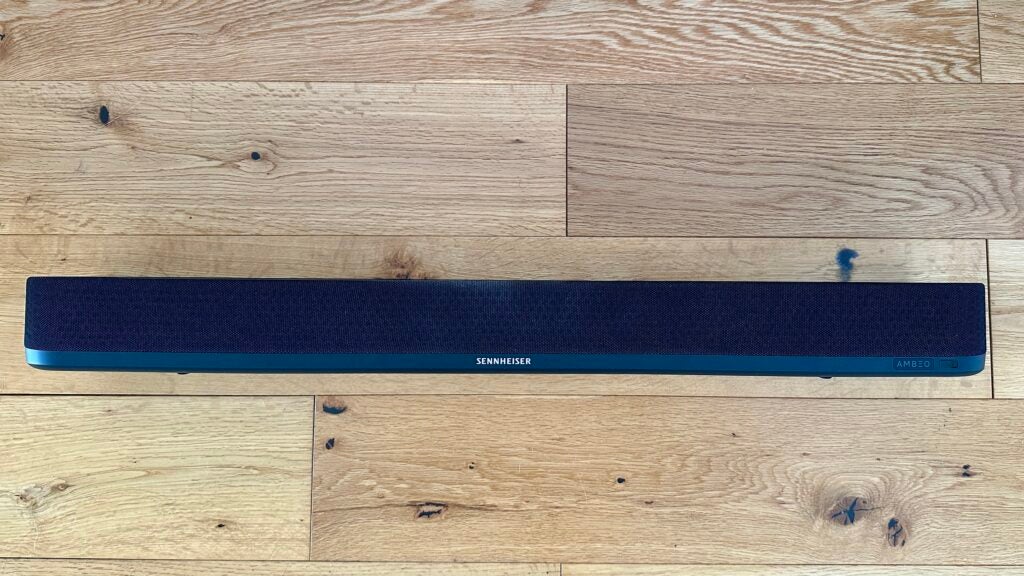
Four of these drivers are 38mm full-range items – there’s one at either end of the soundbar, angled out to create some audio width, and the other two face forwards. The other two are 102mm bass drivers that are concealed behind the plastic of the top panel – they contribute the bottom end of a claimed 43Hz – 20kHz frequency response.
All of these drivers are contributing to the virtual height channels the Ambeo Mini wants to create, and all of them are made of cellulose. They’re powered by 250 watts of Class D amplification.
Getting audio information on board in the first place can be done in any of quite a few ways. There’s Wi-Fi and Bluetooth 5.0 (with SBC and AAC codec compatibility) for wireless stuff, along with Spotify Connect and TIDAL Connect, UPnP, Apple AirPlay 2 and Chromecast – those last two mean easy multi-room integration.
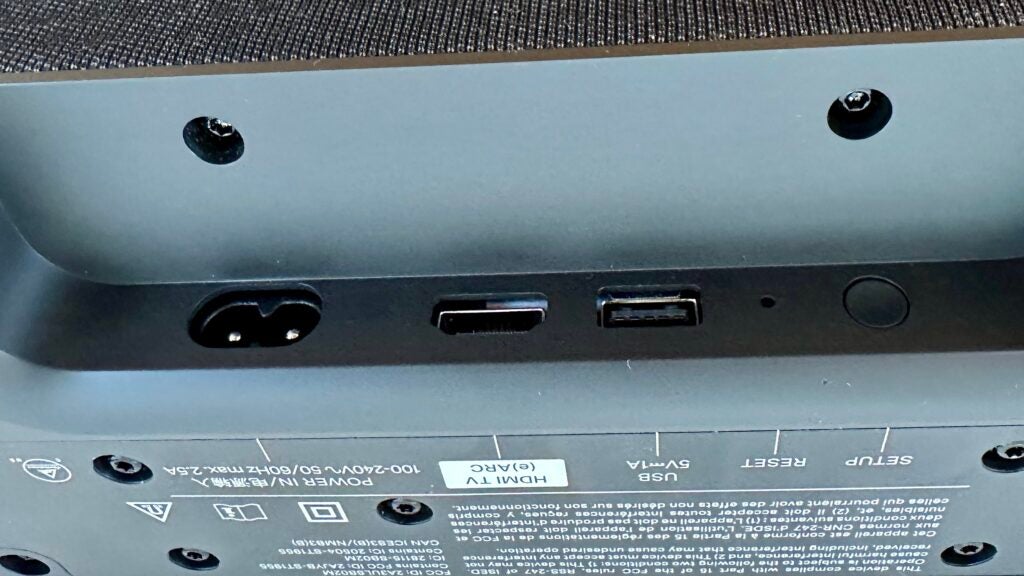
The physical connections are on the rear panel of the chassis – there’s an HDMI eARC socket and a USB-A slot (as well as a mains power input, a reset button, and a set-up button). Those of you hoping for HDMI passthrough will be disappointed.
Setting up and controlling the Ambeo Soundbar Mini is simple, and there are quite a few control options. First off, you’ll need the Sennheiser Smart Control app that’s free for iOS and Android – this is where you get access to the automatic room calibration feature. Position the soundbar, keep quiet while it fires out a series of test tones, and before you know it the Ambeo Mini is optimised to the space in which it finds itself.
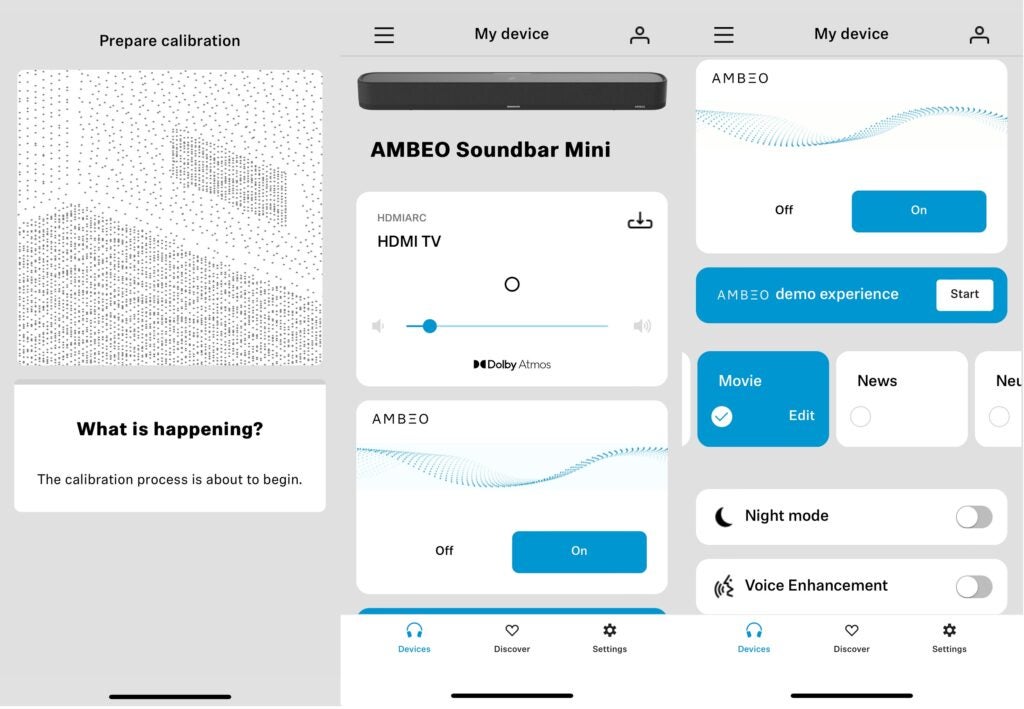
The app is useful in plenty of other ways, too. The obvious stuff like volume control and input selection are available, but there’s also the facility to switch the Ambeo virtualisation technology on or off, select one of the six EQ presets most appropriate to the content you’re watching, check for software updates and so on. It’s a clean and stable interface, and all the better for its stark and unshowy presentation.
There are four far-field mics sunk into the top panel of the soundbar – that’s how it’s able to hear the test-tones. They’re also used to facilitate voice control – the Ambeo Mini has Amazon Alexa built in, and if you’ve a suitable smart speaker on the same network as the Mini you can use Google Assistant too. If you value your privacy, there’s a mute touch-control on there too, along with a few other major controls and an LED strip indicating volume level.
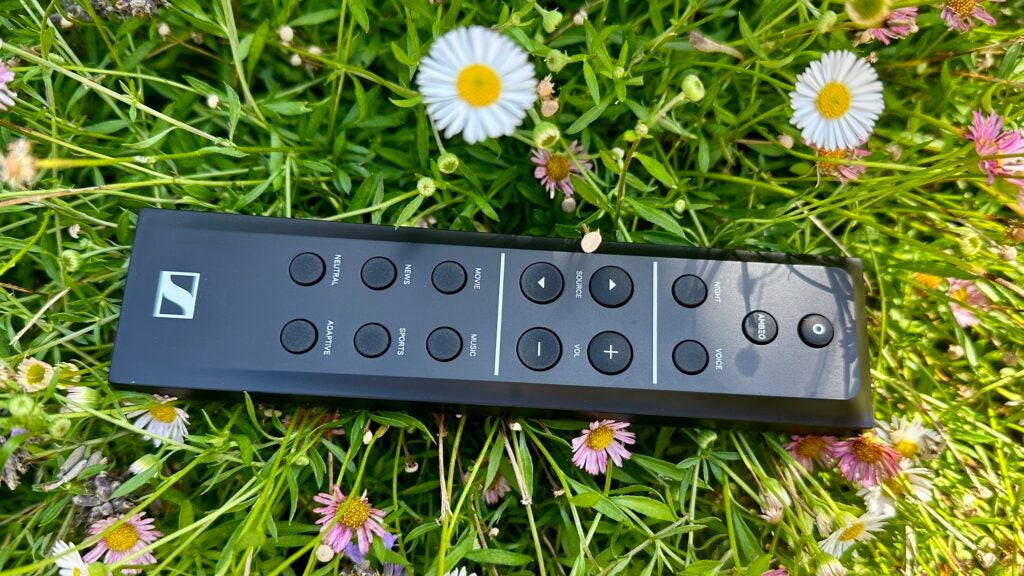
Sennheiser also provides a remote control handset, and a proper one at that. It’s a decent size, nicely shaped, made from robust plastic and features each and every major function. Some backlighting wouldn’t go amiss, and you’ll need to squint to read the labelling of the buttons, but by prevailing standards this is an upmarket item.
Sound Quality
- Ample low-frequency presence
- Open, detailed, and organised sound
- Not as tall a listen as Sennheiser implies
Sennheiser is understandably keen to tell Ambeo Soundbar Mini owners that it can wirelessly pair with as many as four Ambeo Sub subwoofers at a time. But I’d suggest hearing the sort of low-frequency response the Ambeo Mini is capable of all by itself before you rush into anything.
The claims for extension down to 43Hz sound perfectly reasonable – and not only does the Sennheiser dig deep, it hits hard and has proper detail and variation to go with its out-and-out wallop. Its bass performance is prodigious.
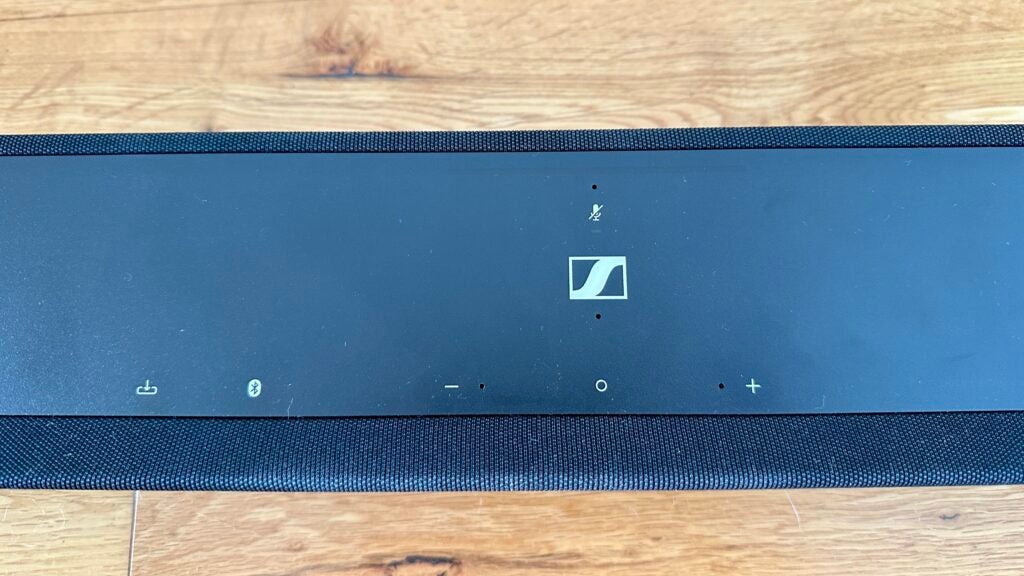
And it’s no slouch where the rest of the frequency range is concerned, either. The midrange is open and informative, with dialogue given a whole stack of detail regarding tone and timbre as well as character and intensity; the top of the frequency range is remarkably bright and substantial given there are no actual tweeters involved. The integration of the frequency range is smooth and convincing despite the low-end intensity, and tonality is neutral and consistent throughout, too.
Dynamic headroom is considerable, and with the soundtrack to Mad Max: Fury Road via UHD 4K Blu-ray on board the Sennheiser’s ability to turn on a dime and switch from quiet to ear-splittingly loud is impressive. Not that there are too many quiet moments in this movie, of course…
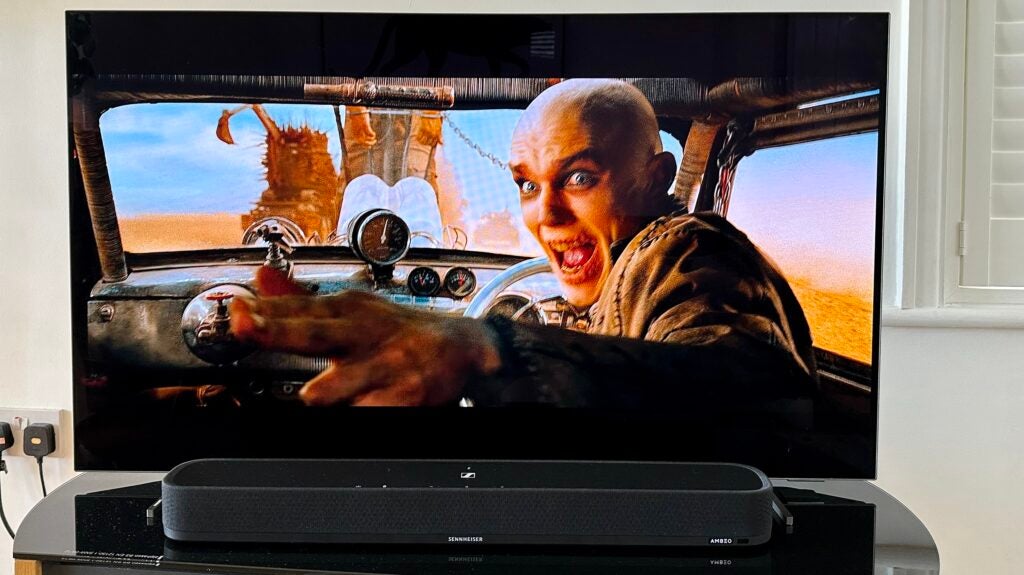
What’s just a little less impressive is the spatial audio aspect of the Ambeo Soundbar Mini’s reproduction. The combination of physical drivers and Ambeo virtualisation technology allows the soundbar to create a soundstage that’s far wider and considerably deeper than its size might indicate is possible – and it’s organised, controlled, and strikes a good balance between focus and separation.
But there’s a shortage of the top effects that are usually the whole point of a spatial audio soundtrack – the Ambeo Soundbar Mini can put sound up around the top of your TV, but if the intention is to create a dome of sound, then it’s a rather squashed dome.
Switching to Atmos-mastered music via TIDAL Connect only reinforces the overall impression. An Atmos file of Life During Wartime by Talking Heads sounds bold and positive, has a gratifying amount of midrange detail available, is separated and unified all at the same time, exists on a remarkably wide soundstage… and is just slightly truncated where the height aspect is concerned.
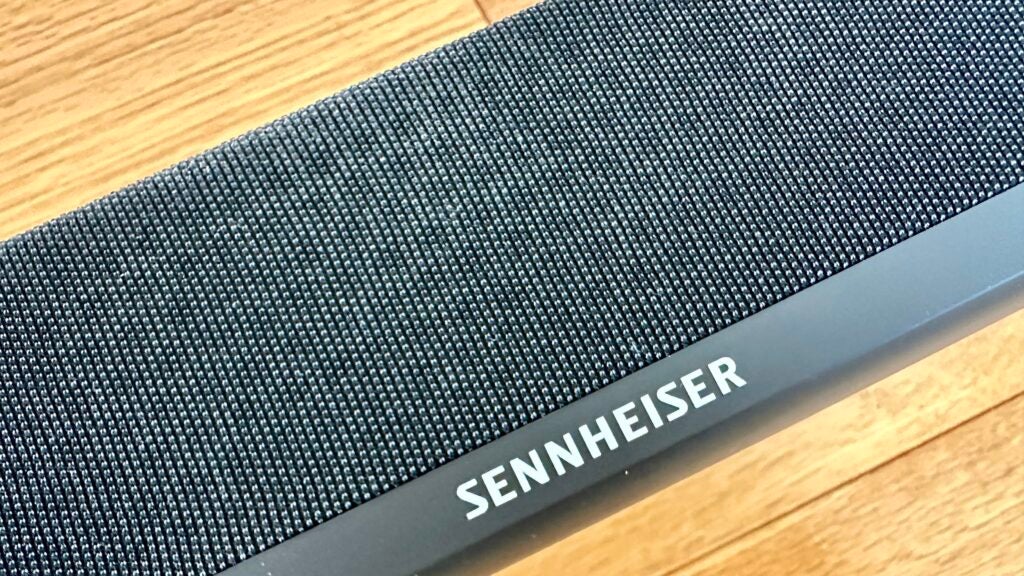
The limits of the Ambeo virtualisation technology are made more apparent by listening to less state-of-the-art content. The 5.1-channel soundtrack to True Grit loses just a little positivity and intensity when compared to the native 7.1.4 -channel alternative – and when I ask the Sennheiser to virtualise some stereo music into a spatial audio presentation, quite a bit of its composure deserts it.
It becomes hazy where it was previously focused, and the soundstage loses a lot of definition. It’s quite a capable music speaker if listened to in stereo – although it can’t help but sound a little small-scale when you do so.
Latest deals
Should you buy it?
You’re after big, robust sound for your modestly sized space: The Ambeo Mini is capable of punchy, room-filling sound as long as that room isn’t massive.
You want full-on Dolby Atmos immersion: This sort of money will buy that – but inevitably it comes from a multi-part product that’s quite a lot bigger than this.
Final Thoughts
Until now Sennheiser has managed to justify the premium pricing of its Ambeo soundbars thanks to their unarguable performance. The Ambeo Mini, though, is slightly different.
By the standards of compact, tidy soundbars it looks quite pricey – even if it’s got a lot of positives where performance is concerned. By the standards of Dolby Atmos soundbars at this sort of money, it’s not quite as immersive as its best rivals – but, of course, it has size and convenience on its side. It’s not for everyone, the Sennheiser Ambeo Soundbar Mini – but for some people it’s going to be absolutely perfect.
How we test
We test every soundbar system we review thoroughly over an extended period of time. We use industry standard tests to compare features properly. We’ll always tell you what we find. We never, ever, accept money to review a product.
Find out more about how we test in our ethics policy.
Tested for more than a week
Tested with real world use
FAQs
The Ambeo Soundbar Mini supports up to four additional subwoofers, but if you wanted to add rear or surround sound speakers then the Ambeo Mini does not support that functionality.







